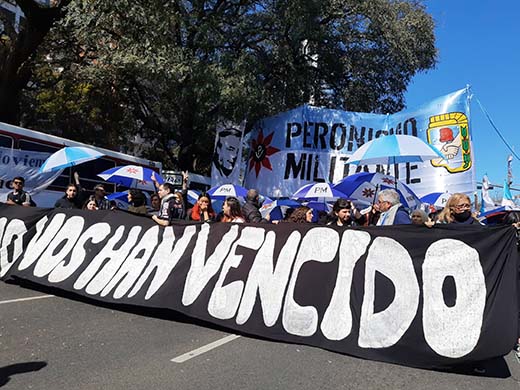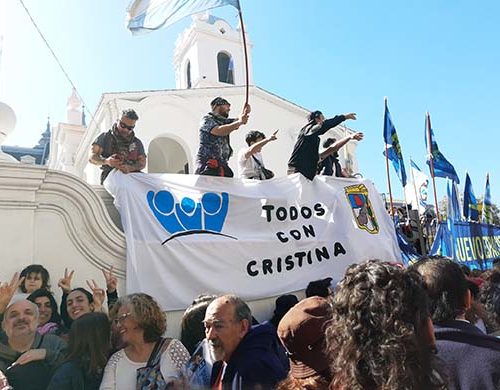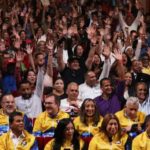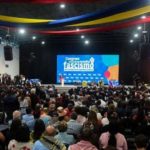Now there is the pronouncement that she (Cristina) is ineligible for public office and must serve 6 years in jail[1]. This does not happen by chance. It illustrates concretely how far the so-called legal system [is prepared to] go against Peronism and ‘Kirchnerism’. Having passed beyond the phase of media poisoning, that system resorts to the farce of a condemnatory judicial censure which, if it fails, will trigger a violent coup d’Etat.
But of what State are we talking about? That of the mafia and the parallel State supported by concentrated financial power, as vice-President Cristina Kirchner said in her speech. A coup process has started, aimed at the democratic State because it is supported by the political forces of the government’s Frente de Todos (Front of Everyone). The integrity of the vice-president notwithstanding, the human rights of all the citizens are again threatened, 39 years after the defeat of the dictatorship.
In reference to her condemnation, here is an excerpt from Cristina Kirchner’s response: “[This] is a condemnation neither by the laws of the Constitution, nor by the administrative laws nor even by the penal code. It is a conviction that has its origins in a penal system that I called, almost naively on December 2, 2019 “lawfare” (the use of the law against its enemies), and which lately I called the concept of ‘Judicial Party’ – perhaps due to some juvenile formation of mine, or as a theorist and analyst reader. But we are not dealing here with a legal act or a Judicial Party. We face the product of a parallel State and judicial mafia. It gives the confirmation of a parastatal system that decides the life, freedom and property of all Argentines, with its existence outside the electoral results”.
The new political scenario in Argentina: Cristina Kirchner challenges the power
Cristina’s speech rebounded against her accusers with the power of a good penalty kick. In her capacity of militant activist, lawyer and architect of mass communication, she put in the dock the judicial and media mafia led by the “Clarín” group. She revealed to the public the leaked discussions of a Telegram group (similar to WikiLeaks, or Intercept in Brazil) that proved actions of concealment and irregular financing during a trip attended by judges, by the businessmen of the hegemonic media as well as by former secret service agents and ministerial officials of the capital. Purposes kept hidden, the encounter took place in a mansion on Lago Escondido (Bariloche[2]) owned by the English magnate Joe Lewis. By all accounts, it was an illicit association. These people object to "the invasion of privacy" and "illegal espionage" but their own use of these instruments has always failed to fault the Peronist leaders or the Kirchnerists.
In Brazil, the Intercept revelations showed the true face of the “Lava Jato”[3]. That was the conspiracy between former judge Moro and prosecutor Dallagnol that had triggered a crisis process in the Federal Supreme Court. The judicial recognition of Lula's innocence and his return by popular vote to Brazil’s presidency coincides with the internal crisis of the national agro-industrial bourgeoisie, the shrinking of the internal market, the neoliberal assault of the finance companies, the hollowing out of the social State as carried out by Bolsonaro through privatizations.
In Argentina today, under a democratic government, one suspects that the leaks about the Lago Escondido’s scandal[4] came from the mafia-like disunity going on in the circles of economic power, themselves concentrated in the hands of Hector Magnetto (of the newspaper Clarín). All this is breaking before the 2023 elections (October 2023). The idea is to block Peronism. [..]
It is worth reviewing the interview with Folha de São Paulo[5] in which Cristina makes it very clear that what needs doing is not just to expand the Court[6], but to put an end to the juridical corporations; without compromising the separation of powers, the judges must be subjected to the popular vote. She cited the good example of the legal system that Evo Moráles consolidated in Bolivia.
A historic moment and a historic speech
As part of her censure, Cristina Kirchner is to be perpetually barred from public office. This is one of the gravest political events of recent times. It puts Peronism on alert, and in motion. The governor of Buenos Aires, Axel Kicillof, says: “It is a ban on Peronism through its most representative person. Cristina's conviction is the burial of Justice’ credibility”.
In 1955 Peronism was banned. Perón was outlawed for 18 years and he was put through the military bombardment of the Casa Rosada (the Pink House – Government Palace)[7]. Nowadays this is done via a Media with Judicial powers, a parallel State that is, “bent on having Cristina dead or in prison” (her own words).

Mobilisation of the Peronist movement – Buenos Aires, 2.9,2022
The stepping down of Cristina Kirchner's from the 2023 presidential candidacy was unexpected; it leaves her electorate and supporters feeling like orphans. But in her declaration, her whole speech is combative. It calls for the reorganization of the political forces of Peronism.
Her trial is not over anyway, and a Peronist reaction is expected. She renounces the candidacy for now, but not the political fight. “What they condemn through me is a model of economic development”. Indeed her opponents proscribe the country, and the social justice, of the Kirchners’ decade. It is not the elections that they concentrate on because they are having to resolve the structural problem of their dependency on a neoliberal economy run by a mafia. This needs resolving. If not, there will be a sinking into the undemocratic abyss of atrocious social exclusion for whichever party wins the October 2023 elections – be it the present Party (Frente de Todos) or that of the Macri's opposition.
In what is called ‘the parallel State’, Hector Magnetto (Clarín) and Judge Ercolini are central figures of Media power and of Judicial power[8]. The struggle against them has been item number one on the agenda of the social movements and of the government. We have not heard the last word yet. Christina's condemnation stands like an ultimatum. Should the passive civil servants stay unmoved, should the judicial reform fails to enlarge the Judicial Council[9], should the restoration of the Media law[10] brings no progress, democracy itself could effectively be over, and not just for the Peronist government.
Rejections and reactions
The [leaked] conversations between judges and businessmen uncovered strategies used to hide the source that financed their trip to Lake Escondido. Following the scandal, President Alberto Fernández ordered an enquiry into this illicit Juridico-Mediatic association[11]. He has took care that those involved should receive a proper trial, and then the Minister of Justice immediately announced a series of relevant measures.
The deputies and senators of the Frente de Todos rejected en bloc the condemnation and disqualification of Vice-President Cristina Kirchner from public office. They demand an audience with President Rosatti of the Supreme Court to get a pronouncement from the Judiciary Council. There is talk of the creation of a commission of inquiry of the two chambers which will invite all those involved in the Lake Escondido affair to testify before Parliament.
Along with the professors and law students of the University of Buenos Aires, the Board of Directors of the Faculty of Philosophy and Letters demand the indictment of Judge Ercolini. Himself judge and law professor at the University, the latter is also responsible for several unproven cases against Kirchnerism. Requests have been made for his expulsion on ground of ethical and moral incompetence.
An international reaction to Cristina's condemnation has grown, encouraged by the alert calls launched by Pope Francis as well as by the prosecutor's office of the Pan American Committee of Judges for Social Rights and Franciscan Doctrine.
On 19 December 2022, a meeting of the Puebla Group[12] at the Kirchner Cultural Center issued a statement rejecting the judicial decision against Cristina. Their decision they said, "opens a new chapter in the legal war that has unfolded in the entire region against progressive leaders such as Lula, Morales and Correa”.
Solidarity with Cristina is both Latin American and global. There were statements from all the following: Lula (Brazil), López Obrador (Mexico), Luis Arce (Bolivia), Evo Moráles (ex-president of Bolivia), Xiomara Castro (Honduras), Miguel Díaz-Canel (Cuba), Nicolás Maduro (Venezuela), José Mujica (ex-president Uruguay), and many others. The ground is also being prepared to bring Cristina Kirchner’s case before the International Court of Justice. The Frente de Todos, the social movements, La Câmpora[13] and the trade union federations (CTA and CGT) were speakers at the meeting of the Puebla Group in her support [14]. There, vice-president Cristina Kirchner herself delivered the closing speech. The essential thing is that people feel ready to take to streets and squares to defend her, to defend democracy in Argentina.
Perspectives
From now to the elections of 22 October 2023, the Frente de Todos’ great challenge is this: accelerate and deepen the 2019 commitments "in our world convulsed but full of possibilities for the real change of last centuries”. Pepe Escobar (Brazilian journalist and analyst) said this on TV247, adding that the Global South goes out of sync with the capitalist empire concentrated in the financial corporations, while reinforcing its BRICS links with China and Russia.
The victorious return of Lula to the presidency of giant Brazil is a blow to regional “lawfare” (as called). Although on the other hand, ‘lawfare’ has also dealt a tragic final blow to Pedro Castillo in Peru[15]. This threatens Argentina next door. We have entered a threatening phase that gives impunity to a parallel Juridico-Mediatic mafioso State. Cristina Kirchner issued a vehement warning about it. The democratic institutions, the immediate future of citizenship, the rights to life, to speech and to joy – the right to organize and to demonstrate are all threatened. The new scenario opening up is not solely electoral: Peronism must reorganize with political determination. It must question again the concentrated power. Retake the streets, retake the squares.
From our correspondent in Buenos Aires – 12 December 2022
Photo: Mobilization of the population of Buenos Aires in support of Cristina Kirchner on 7 September 2022
[1] In November 2022, vice-president Cristina Fernandez de Kirchner was sentenced to 6 years in prison and banned for life on holding any public office. She was found guilty of a €1 billion fraud in matters relating to public works. Fernandez was twice president of Argentina between 2007 and 2015. She cannot be arrested for the moment as she enjoys immunity through her governmental role. She has also launched an appeal process.
[2] A town in Argentina’s Patagonia.
[3] The Economist of 15 Oct 2019 reported that “in July 2017 Sergio Moro, a crusading young judge, convicted Luiz Lula, a popular former president, of corruption – sentencing him to nine years in jail for receiving a beachside apartment from a construction magnate who obtained padded government contracts”.
[4] Telesur 5 December 2022 informs that President Alberto Fernandez and the Justice Minister Martin Soria denounce federal judges, prosecutors, officials and businessmen who took a trip to Lago Escondido. About these people, President Fernandez said: “All of them [are] involved in a perverse game of bribery that seriously affects the proper functioning of the State”.
[5] Folha de Sao Paulo is a Brazilian daily newspaper. On 5 December 2022, News 360 reported that, in that interviews, Cristina Fernandez assumed she will be sentenced in the corruption trial against her.
[6] On the 7 August 2022, the International Press Agency mentioned that a new Federal pact in Argentina would try to create a 25-member court. New members would be incorporated, and “in this way, the future of the country will not be in the hands of a majority of three people, as is currently the case”.
[7] DBpedia says: “The bombing of Plaza de Mayo was a massacre that took place in Buenos Aires, Argentina on 16 June 1955. On that day, 30 aircraft from the Argentine Navy and Air Force strafed and bombed Plaza de Mayo square in Buenos Aires in the largest aerial bombing ever on the Argentine mainland. The attack targeted the adjacent Casa Rosada, the official seat of government, as a large crowd was expressing support for president Juan Perón. The strike took place during a day of official public demonstrations to condemn the burning of a national flag allegedly carried out by detractors of Perón during the recent procession of Corpus Christi. The members of the military reacted after growing tension between the president Juan Perón and his actions against the Roman Catholic Church. Wikipedia says: The number of identified bodies was put at 308, including six children; an unknown number of victims could not be identified. The disregard for civilian lives and the violence with which the act was carried out has prompted comparisons with the wave of state terrorism during the dictatorship of 1976-1983.
[8] Under the title ‘The Dirty War’, Wikipedia reports that in September 1978, a group of businessmen (Magnetto included) had been having shady dealings with members of the military junta. In 2016 (when Macri in government) Federal Judge Julian Ercolini ruled that there was not enough evidence of wrong-doing against Magnetto (and one other), and these were then declared innocent.
[9] In October 2022, the government pushed an Amended Council of Magistrates Reform Bill through the Senate. To meet long delayed legal specifications, it was proposed to expand the Judicial Council from 13 to 17 members. The new panel would include more representatives of the legal and judicial spheres but continue to exclude the Supreme Court.
[10] In 2021, president Fernandez increased state control over the economy. He then produced an executive order expanding the government’s role in the telecommunications sector.
[11] TeleSur informs that, on 5 December 2022, president Fernandez ordered a criminal investigation into the Lago Escondido trip as well as into the [leaked] exchanges between a group of judges, prosecutors, former public officials and former agents of the Federal Intelligence Agency (AFI) of the Cambiemos administration. Formed in 2015, Cambiemos (along with others) nominated Macri for president (2015-2019).
[12] The Puebla Group is a political forum made up of more than 60 current and former Latin American and Spanish leaders. It has strongly condemned Cristina’s sentencing by a court.
Argentina holds the pro tempore presidency of the Community of Latin American and Caribbean States (Celac). The Puebla Group considers this regional integration of “vital importance”. It is the only organization that represents all 34 Latin American countries.
In August 2022, MercoPress informed that the Puebla Group seeks the convergence of the different integration mechanisms that exist in the region, such as the Pacific Alliance, the Southern Common Market (Mercosur), the Andean Community, and the Bolivarian Alliance for the Peoples of Our America (ALBA), among others. Besides its president Ernesto Samper (former president of Colombia), the Puebla Group has among its most prominent members former presidents José Mujica (Uruguay, 2010-2015), Evo Morales (Bolivia, 2006-2019), Rafael Correa (Ecuador, 2007-2017), Dilma Rousseff (Brazil, 2011-2016), Lula da Silva (Brazil, 2003-2010), Fernando Lugo (Paraguay, 2008-2012), Manuel Zelaya (Honduras, 2006-2009), Martín Torrijos (Panama, 2004-2009) and Rodríguez Zapatero (Spain, 2004-2011); as well as current Presidents Luis Arce Catacora of Bolivia and Argentina’s Alberto Fernández.
[13] La Campora is a political organisation formally founded in 2006. It is strongly Kirchnerista and supported Cristina from the start (2007).
[14] On 24 August 2022, TeleSur reported that the leaders the present ruling coalition in Argentina, ‘the Front of All” (FT), ratified their support for Vice President Cristina Fernandez-Kirchner. Not only the Front of All closed ranks behind Cristina, but “the entire government joined, first with a statement, and then with public expressions from representatives of all sectors of the coalition” Filo News reported. Even the Economy Minister, Sergio Massa, a member of the Renovating Front who had tried to stay out of the discussion, joined in. FT’s Senator Juliana Di Tullio confirmed that social organizations are preparing a large mobilization in support of former President Fernandez-Kirchner, for whom prosecutor Diego Luciani has requested 12 years in prison.
[15] Pedro Castillo was elected president of Peru in July 2021. On 7 December 2022, a judicial coup was triggered against him as he denied charges of corruption and influence trafficking. He attempted to dissolve Congress to stop impeachment proceedings. He enacted a curfew, established an emergency government and called for a Constituent Assembly. He also called for the reorganisation of the judiciary and prosecutor’s office. After his arrest by national police, the Public Prosecutor’s office announced he was charged with breaching the constitutional order. Vice-president Dina Boluarte accused him of a coup attempt, and was soon sworn in as the new president.
















